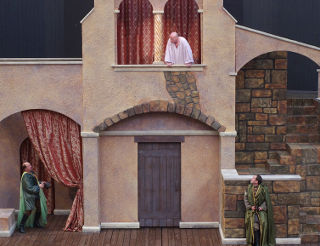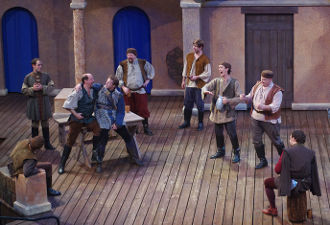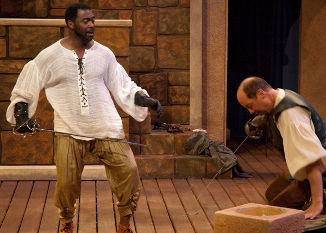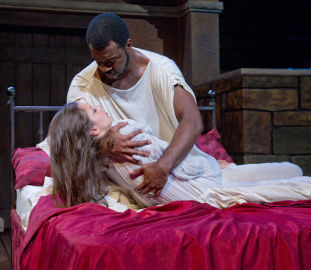Summary 
An expertly directed tragedy featuring a cinematic score and lush period costuming, anchored by vivid supporting portrayals of Brabantio and Cassio, driven by strong portrayals of Iago and Desdemona, and elevated by an exceptional portrait of Othello. The tragic Moor is confident and proud, regal and soldierly, but tragically flawed and ultimately doomed, deceived by his own evil-eyed Ensign.
Design
Directed by John Sipes. Costume design by Helene Siebrits. Scenic design by John Stark. Lighting design by Julie Mack. Sound design and musical compositions by Michael Rasbury. Dance choreography by Greg Merriman.
Cast
Matt Penn (Iago), Charlie Wright (Roderigo), Henson Keys (Brabantio), Daver Morrison (Othello), Andy Talen (Cassio), Amanda Catana (Desdemona), Corliss Preston (Emilia), Kate McDermott (Bianca).
Analysis

John Sipes, a former artistic director of the Illinois Shakespeare Festival, returns to the Festival to direct for the first time since Coriolanus in 2001. Sipes' Othello is traditionally staged within a rust-and-beige town square that represents both Venice and Cyprus. Bricks and splitting plaster separate a pair of arched doorways stage right from a heavy wooden door upstage center and a winding castle-keep stairway stage left. Flowing curtains are red-and-gold for Venice and sea-green for Cyprus, the stage itself a series of narrow dark-brown planks like a pier or boardwalk. Sipes begins with ominous but cinematic music and a prologue, as tawdry Venetians take to the stage in whoops and hollers, masked and dancing. The dancers circle the stage in a kick-dance, pantomiming sexual acts to a persistent and booming drum beat.
When Matt Kemp appears as Iago, the dancers scatter and the music stops, and Sipes segues to 1.1 and the rousting of Brabantio. Kemp's Iago, tall and soldierly, balding and goateed, squinty-eyed and appearing always-in-thought, wears a light green jacket over a dark green jerkin, the color of the monster jealousy. He plays the officious but evil Ensign as something like a concealed Richard III - "I am not what I am" - a conniving sociopath, but without the hunchback and withered arm. Kemp's Iago is impressively stoic despite the turmoil of a conniving mind, his smiles forced, his laughter feigned. He ruffles Roderigo's hair as if his friend is a recalcitrant child - "be a man" - and kneels beside him to turn him from drowning himself. Multiple layers of motives slowly reveal themselves 1.3, from basic venom - "for you a pleasure, for me a sport" - to revenge for Emiila's honor, as he reveals in his first soliloquy. By the time the soliloquy concludes, Kemp's Iago has twitching fingers and a tapping foot and soon thereafter in 2.1 he hints at another motivation - his own ardor for Desdemona - and then yet another, a desire to shine in the eyes of his commanding officer: "thank me, love me, reward me." By the time Cassio taunts him as an Ensign to his Lieutenant, the audience sees another motivation - ambition - and Kemp's Iago becomes cruelly single-minded.
Kemp's Iago is the driving force within the production, much like the hunchback in Richard III, and Sipes bolsters Iago's menace with strong performances in smaller roles. Henson Keys' trembling old Brabantio, just a minor character, is given crushing weight by the wounded-looking Keys: defiant in the face of loss, Keys' Brabantio slaps the imposing Othello across the face, then is impeded by his servants from launching another assault. Brabantio, paternal in a crushed blue velvet-and-fur robe, shows no racism or classism, just the Lear-like agonies of a betrayed father losing a daughter. He hears of his daughter's romance - and perceived treachery - with his hand over his heart, his expression anguished, his lip quivering, and his hands curl into fists as he collapses but refuses assistance. Brabantio hoists himself to a stone bench at the edge of the stage as Desdemona and Othello wax eloquent in a spotlight. He listens to them with a broken-hearted shaking of his head - he hears Iago described a "a man of honesty and trust" - then raises his hand to prevent Desdemona from approaching him.

Just as effective is Andy Talen's portrayal of Cassio, a tall and lean, curly-blond-haired Florentine who - along with Iago - draws a sword in 1.3 defense of Othello against Brabantio's men. Talen's handsome Cassio, dashing in manly shades of dark blue, is soldierly with Othello and gracious with Desdemona, dropping courteously to a single knee within the thunder-and-rain storm at Cyprus. He reveals some vulgarity with Bianca, she grasping him firmly by the bottom, the cork from his flask between her teeth in 2.3, but his undoing comes at the hands of the more subtle Iago - "happiness to their sheets" - who leaps atop a stage-right table to clap his hands and lead a boisterous drinking song among the guard. Talen's Cassio reveals fury at a challenge, glaring at a Venetian draining a cup of wine in a drinking game, then swilling from an entire pitcher at the top of the stairs. When he collapses he falls and the guard catches him, embarrassing him - "you must not think I am drunk" - in his drunkenness, and he attempts to storm off but staggers into the upstage doorframe. After the public fight picked by Roderigo, Talen's Cassio becomes sober - "my reputation!" - his face buried in his hands as Kemp's Iago pretends to console him. When he falls to his knees, Iago joins him in a premonition of Iago with the deluded Othello, later, in 4.1. Talen's Cassio proves as fully deceived - "I never knew a Florentine more honest" - as Othello himself.
Under Sipes' steady hand, Kemp's Iago propels the Shakespearean dynamics, but with Daver Morrison's superb portrayal of the titular General, the tale becomes deeply moving and truly tragic. Morrison's black-bearded and burly Othello is young enough to be physically impressive - broad-shouldered and swaggering - yet old enough to reveal worldliness, confidence, and maturity, all wrapped in a blazing baritone and a regal inflection. Morrison's Othello commands the stage from his earliest appearance: he stops skirmishes with Brabantio's men through an authoritative shout; with just a withering glare he silently admonishes a carousing Cassio, who is supposed to be supervising the watch but is instead flirting with Bianca; he breaks up the scuffle between Cassio and Roderigo with an unsheathed sword as the alarm bells wail; and at Cyprus 2.1 he swings Desdemona around in a big embrace, then hoists her like a child for a long kiss while the soldiers cry shouts ("the Turks are drowned!") of victory.
Morrison's larger-than-life Othello is well-supported by the female characters, Desdemona a brash if diminutive brunette, bursting with confidence through the upstage doors as Othello recounts his "world of sighs." And big-hearted Emilia wears her heart truly on her sleeve, embarrassed publicly by Iago's slap of her bottom, flinching when he raises a hand to her after she has stolen the strawberry handkerchief, spitting at the strumpet Bianca in the street, and humming along to "Willow" 4.3 with the heart-broken Desdemona as she brushes her hair.
Morrison's Othello begins the always-difficult but pivotal sequence in which his trust in Desdemona begins to slip, and his words and actions are increasingly excruciating, as he slowly comes to a horribly wrong conclusion. When Iago pointedly tells him "look to thy wife," Morrison's Othello merely wipes at his sweaty brow with a handkerchief similar to the one he has given Desdemona, but moments later in 3.4, when she tries to wipe his brow and relieve a supposed headache, he snatches the original away and throws it down: "I am very sorry you are not well." He becomes more tense, his eyes focused offstage, and by 4.1 he is physically agitated, grabbing Iago - "give me the ocular proof" - and starting to strangle and punch him. He crushes the rose gifted to him by Desdemona so the red petals fall away from his hand, then stomps on the stage in a martial rhythm - "blood, blood, blood" - before falling to his knees. Iago joins him, side by side on their knees, just as Iago had previously joined both Roderigo and Cassio, and he promises to murder for Othello. Morrison's Othello turns to him in gratitude - "my Lieutenant" - as Kemp's Iago replies, "I am yours forever," and Sipes fades to blood red for the intermission.

Sipes' handling of his actors and the complicated storyline is impressive, especially his threading together of themes. For example, Iago's slow poisoning of Othello's feelings for Desdemona - "I will pour this pestilence in his ear" - is mirrored by Sipes in Iago's relentless pursuit of Cassio. Kemp's snake-like Iago follows Cassio to various points across the stage, pressing his points, finally settling upon a downstage wall. And during 3.3, a falsely smiling Iago listens as Desdemona pleas for Cassio's reputation, pretending to wipe down one of the fencing swords. Sipes has Desdemona swipe the sword from a mock-surprised Iago and pretend to threaten Othello with it, making him promise to speak with Cassio ("I can deny thee nothing") then giving him the red rose and a kiss. Best of all is the spiritual struggle between Iago and Othello being visualized by Sipes, himself an expert fight choreographer, as a fencing match as well as a verbal war. They argue back and forth as they prepare their swords - "he echoes me" - and continue to duel in debate - "beware, my lord, of jealousy" - as they swing and block and parry: "I'll see before I doubt."
The second half of Sipes' production resumes in the same scarlet lighting with the cinematic string score, as Desdemona frantically scurries across the stage in search of her missing handkerchief. Morrison's Othello is stern and cold to her, professional and courteous to others, flinching as if slapped at her mentioning the name "Cassio." When he demands his gift - "lend me thy handkerchief" - it is with menacing repetition and rising volume, his seething impatience palpable. After his collapse and seizure, believably played with admirable restraint - "work on, my medicine" - Iago encourages violence - "strangle her in her bed" - and Morrison's Othello succumbs, striking Desdemona 4.1 with the rolled up letter from Venice, driving her to the stage. In a particularly ugly scene that is difficult to watch, Morrison's Othello spins Desdemona bodily around repeatedly, not just to physically hurt her, but to frighten and embarrass her as well.

Later, Morrison's Othello is obviously torn emotionally, kneeling beside his wife and folding her hands together to force her to pray, then knocking her down to the stage three times, each time repenting before his temper flares again. The three victims - Othello, Desdemona, Emilia - all wear loose-fitting white night-clothes like sacrifices or even angels, and when Othello enters Desdemona's bedchamber 5.2 with his candle - "put out the light then put out the light" - he continues the theme of repetition, especially the almost ritualistic repetition of three times, kissing his wife thrice. When she wakes, she smiles and embraces him, but he raves and places a heavy white pillow over her face. The death scene is harrowing, Desdemona thrashing as Emilia pounds on the door offstage and cries out, and she chokes and gasps before expiring. Kemp's Iago desperately tries to keep Emilia silent, but when Othello mentions the damning handkerchief, they both spin and face the Moor from opposite sides of the stage. Undone, Kemp's Iago slices his wife across the midsection and races off as she sags in a heap - "Moor, she was chaste" - beside Desdemona's bed.
Sipes' expert production comes to a gut-wrenching conclusion, as Morrison's Othello makes his realization and becomes again a stern military officer rather than a wounded husband. He stands at attention, approaches the forced-to-his-knees Iago to give him a vicious slice across his groin - "but not killed!" - and asks Cassio's pardon. He then describes himself in poetic terms - "one who loved not wisely but too well" - and stabs himself hara-kiri style, dragging a blade across his abdomen and collapsing next to Desdemona: "to die upon a kiss."